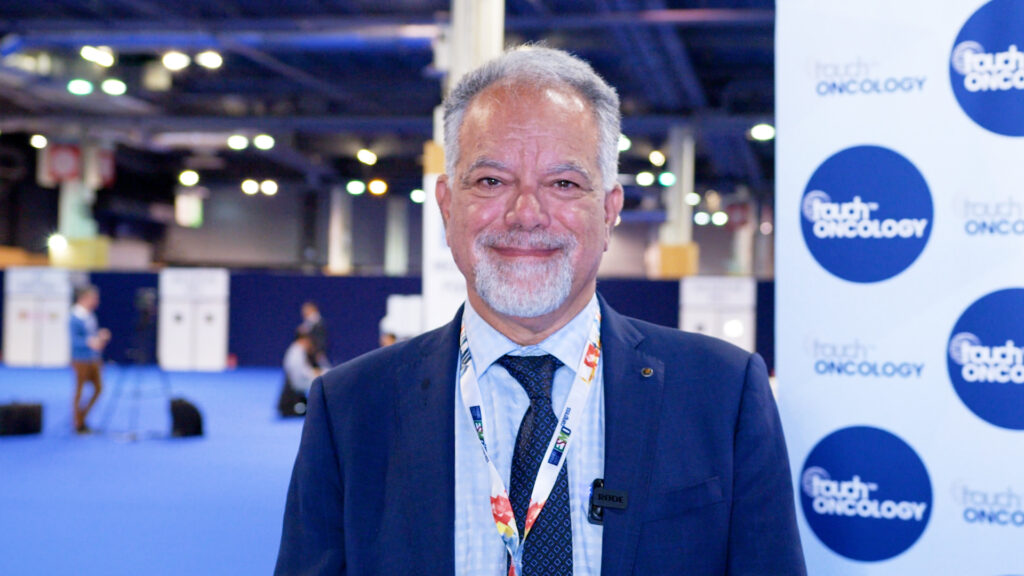The uniquely designed Prostate Biomarker (ProBio) study (NCT03903835) used outcome-adaptive randomization to compare biomarker-driven treatment selection against physician’s choice, and to compare androgen receptor inhibitors (ARPIs) against standard-of-care (SOC) and taxanes in castrate-resistant prostate cancer (mCRPC).
To learn more about the trials unique design, the details surrounding the biomarker signatures investigated and the treatments compared, we spoke with study investigator and medial oncologist, Prof. Henrik Grönberg (Karolinska Institutet, Stockholm).
Importantly, in this interview, Prof. Henrik Grönberg also discusses the results and the clinical implications of these findings. In particular, we focus on the implications in terms of selecting the best treatment for mCRPC, but also the potential impact the findings could have on future trial design.
Questions
- Could you give us a brief overview of the treatment paradigm for metastatic castrate-resistant prostate cancer (mCRPC)? (0:11)
- Could you tell us about the aims and rationale behind the Prostate-Biomarker (ProBio) trial? (0:58)
- What was unique about the methodology of this study? (1:23)
- What were the key findings from the trial? (3:31)
- How do you think these findings will impact future treatment decisions? (4:53)
Associated abstract:
LBA86 – Androgen receptor pathway inhibitors or taxanes for patients with metastatic castration-resistant prostate cancer: A direct comparison in ProBio, a randomized, outcome-adaptive, biomarker-driven platform trial
Disclosures: Henrik Grönberg has participated on advisory boards for Bayer, Astellas, Janssen and AstraZeneca; and received grant/research support from Janssen and AstraZeneca.
Support: Interview and filming supported by Touch Medical Media Ltd. Interview conducted by Gina Furnival
Filmed in coverage of the ESMO 2023
Click here for more content on prostate cancer & for further ESMO 2023 highlights visit here.
Transcript
My name is Henrik Grönberg, I’m am a Medical Oncologist and a Professor here at the Karolinska Institutet in Stockholm, Sweden.
Q1. Could you give us a brief overview of the treatment paradigm for metastatic castrate-resistant prostate cancer (mCRPC)? (0:11)
In the last ten years there have been fantastic developments, with new, different treatments in castrate-resistant metastatic prostate cancer, and, we now have chemotherapy as docetaxel, and we have the new hormonal agents, the androgen receptor inhibitors, enzalutamide and abiraterone, and also new drugs like PARP inhibitors and radium, and very recently also lutetium. So, we have a big spectrum of 5-6 different treatments now in this space for these patients. and the key question for us now is who to treat with, which treatment first.
Q2. Could you tell us about the aims and rationale behind the Prostate-Biomarker (ProBio) trial? (0:58)
In ProBio, we are trying to find biomarkers to identify subsets of patients that respond specifically well, to certain treatments. This is really important because we have many different treatments for the same patients today.
Q3. What was unique about the methodology of this study? (1:23)
ProBio has a unique study design. It’s a platform trial where we are comparing 4 or 5 different treatments at the same time, compared to a standard-of-care treatment, which is physician choice. But we also used something unique, which is called, an adaptive randomization – an outcome adaptive randomization. It really means that we are, updating the randomization probabilities based on the outcome of each patient in the study. For example, if a patient received a specific treatment with a specific biomarker, and responses well. The next time a similar patients comes into the study, it’s more likely that he will receive that treatment, and vice versa, if the first patient didn’t respond, the randomization probability for the next patient would decrease. That means that the whole system will learn over time, and actually get better and better to assign patients to the right treatment. And the second thing that is also unique, is that we use biomarkers prospectively. We used something that’s called circulating tumor DNA (ctDNA), which is a simple blood test, where we isolate small, DNA strands from the tumor and do a specific genomic analysis. Based on that, we we have 4 different biomarker signatures, and based on that, we have hypotheses, and then we can randomize patients, to the right treatment. There are also other things that are specific in this trial, in that we also use re-randomizations. That means that every patient who came in the first phase of castrate-resistant prostate cancer – and will eventually progress – we can take a new ctDNA sample and re-randomized him, to a new treatment based on the new biomarker signature.This makes this kind of treatment, or this kind of design, is very effective and so we don’t need as many patients as you use in a normal, randomized clinical trial.
Q4. What were the key findings from the trial? (3:31)
These are the first major findings that we report, and we report the treatment effect of the androgen receptor inhibitors, abiraterone and enzalutamide compared to taxanes, than compared to standard-of-care. And the key finding is that the androgen receptor inhibitors have a much longer progression free survival and overall survival both compared to standard-of-care and to docetaxel, the taxanes. But this is a biomarker driven trial, and of course, we saw, we were looking at different biomarker signatures, and we saw directly that two of the biomarker signatures the androgen receptor wild type TP53 subtype, and the TMPRSS2-ERG-fusion subtype, were the ones that actually had the biggest advantage of using endocrine receptor inhibitors compared to the other two treatments.
However, in the TP53 mutated subtype there was no difference in, treatment effects compared to taxanes and androgen receptors and the physician’s choice. So there’s no difference in a subset of these patients, the TP53 mutated one, needs another treatment than those two.
Q4. How do you think these findings will impact future treatment decisions? (4:53)
I think that patients that have not received an androgen receptor inhibitor when he becomes a castrate-resistant, metastatic, will now receive the androgen receptor inhibitors first.
And you can also look at both the European and US guidelines, that say that you can either give a taxane or androgen receptor inhibitor. And I think that our data, together with other data, will change those recommendations.
The other thing that I definitely think that the study design we have, might be a role model for future oncological trials where you have many different treatments at the same time.
And, that was definitely the questions or the insights I got following my talk at ESMO. It’s also really because it really, as I say, has a very high ethical standard. I mean, I’m I’m a clinican myself treating patients, and and I want to give to him a study like this which means that the patients in the experimental arms, will always be exposed to the best available treatment that we have. But also in the control arm as we let it free, means that the patient will always get the best treatment that the physician’s thinks at that time. And that will change over time. And I think that’s a big difference between randomized clinical trials today, where you have a fixed-control arm, that is set from the beginning, and a fixed-experimental arm. And if you run a study over 4 or 5 years, the control arm will be unethical at the end of the study.













